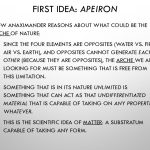
Anaximander’s philosophy
29 Ottobre 2024
Talking about Thales
29 Ottobre 2024Anaximenes, like Thales and Anaximander, was part of the Milesian school of philosophy. However, unlike his predecessors, he identified air as the arché, or the original principle from which everything originated.
Air as a Cosmic Principle
Anaximenes proposed a vision of the universe where air, as the fundamental principle, is omnipresent and permeates all things. According to the philosopher, this element is in constant motion and, through processes of rarefaction and condensation, gives rise to all other elements:
- Rarefaction: When air is rarefied, it becomes fire.
- Condensation: Conversely, when it condenses, it first becomes wind, then clouds, water, earth, and finally, stones.
Through this approach, Anaximenes provided a rational and unified explanation for the diversity of natural phenomena, tracing everything back to a single original principle: air.
An Evolution of Milesian Thought
Anaximenes represents an evolution of Milesian thought compared to Thales and Anaximander. While Thales identified water as the original principle and Anaximander proposed an indeterminate principle (apeiron), Anaximenes focused on a more dynamic and omnipresent element: air.
In fact, air is not just a passive element but is conceived as an active principle, in continuous movement and transformation. This concept of air as pneuma (vital breath) would significantly influence later philosophy, especially Stoicism.
Comparison with Anaximander
- Original Principle: Anaximander postulated the apeiron, an indeterminate and infinite principle, while Anaximenes identified air as a specific, omnipresent element.
- Transformation: Both philosophers acknowledged a process of element transformation, but Anaximenes explained it in more detail through rarefaction and condensation.
- Dynamism: While Anaximander emphasized the cosmos’s dynamism, Anaximenes specifically attributed it to air, which he conceived as an active, constantly moving principle.
Anaximenes and Ancient Medicine: A Vital Breath
Anaximenes’ idea of air as the principle of all things had a significant impact on ancient medicine. Air, understood as pneuma, or vital breath, was associated with breathing, life itself, and vital processes.
- Pneuma and Health: Proper circulation of pneuma was considered essential for health. Imbalances in this vital breath flow were associated with illness.
- Breath and Soul: Breath was seen as the link between body and soul. When breathing ceased, so did life.
- Influence on Hippocratic Medicine: Anaximenes’ theories influenced the Hippocratic medical school, which placed great emphasis on the balance of the four humors (blood, phlegm, yellow bile, and black bile). Though not directly connected to pneuma, the concept of bodily fluid balance aligns with the idea of a vital principle permeating the body.
Anaximenes and Empedocles: Air and the Elements
Anaximenes and Empedocles, both pre-Socratic philosophers, offered differing views on air and its role in the cosmos.
- Anaximenes: For Anaximenes, air is the original principle from which everything originates. Through processes of rarefaction and condensation, air gives rise to all other elements.
- Empedocles: In contrast, Empedocles postulated the existence of four fundamental elements: earth, water, air, and fire. Air is one of these elements but is not considered the original principle.
While Anaximenes viewed air as a dynamic, constantly transforming principle, Empedocles placed it within a more complex framework of four elements interacting through the forces of love and strife.
Religion and Mythology in Anaximenes’ Thought
Though we lack direct texts from Anaximenes, it is likely that, like many thinkers of his time, he was influenced by the religious and mythological beliefs of his culture. However, his attempt to provide a rational explanation of the universe distinguishes him from older myths.
- Pantheism: The idea of air that permeates everything and gives life to all can be seen as a form of pantheism, a conception identifying God with nature.
- Rationality: Despite the influence of religious beliefs, Anaximenes sought to explain the world through reason and observation rather than myths and legends.
Anaximenes and Stoic Philosophy: The Breath of the Logos
Anaximenes’ influence on Stoic philosophy is evident, especially in the concept of pneuma, the vital breath. For the Stoics, pneuma is a kind of rational fire, a divine breath that permeates the universe and animates every living being. This conception finds its roots in Anaximenes’ idea of a cosmic air, the active, vital principle of all things.
The Stoic pneuma, however, goes beyond the simple conception of air as an element. It is understood as the ordering force of the universe, the logos that shapes and moves everything. In this sense, the Stoic pneuma connects with Heraclitus’ philosophy, for whom logos is the cosmic fire that governs all transformations.
Anaximenes, Plato, and Aristotle: The Soul and the Body
The concept of the soul among ancient Greek philosophers is a complex and nuanced subject.
- Anaximenes: Though he did not leave explicit writings on the soul, we can infer from his theories about air that he considered the soul as part of the cosmic pneuma, a vital breath animating the body.
- Plato: For Plato, the soul is divine, preexisting the body, and destined to return to the realm of ideas after death. The soul is tripartite: rational, spirited, and appetitive.
- Aristotle: Aristotle, on the other hand, conceived the soul as the form of the body, closely tied to it and inseparable from it. The soul is the entelechy of the body, making it what it is.
Comparisons:
- Materialism vs. Dualism: Anaximenes and Aristotle propose a materialistic view of the soul, linking it closely to the body. Plato, however, adopts a dualistic position, sharply separating soul and body.
- Immortality: Plato believes in the immortality of the soul, while Aristotle sees it as tied to the body’s vital functions. Anaximenes, though not explicitly addressing immortality, seems to suggest a continuity between the individual soul and the cosmic pneuma.
Mathematics in Anaximenes: A Significant Absence
Unlike later philosophers like Pythagoras and Plato, there is no evidence suggesting that Anaximenes had a particular interest in mathematics. His philosophy is more focused on seeking an original principle and explaining natural phenomena through direct observation.
However, it is possible to assume that Anaximenes, like many thinkers of his time, was aware of the importance of order and measure in natural phenomena. The very idea of a single principle from which everything derives implies a search for an underlying order in the diversity of things.
Conclusion
Anaximenes, with his theory of air as the vital principle, left a significant mark on ancient philosophy. His idea of pneuma profoundly influenced Stoicism and contributed to a more organic and dynamic conception of reality. Although not a mathematician, Anaximenes anticipated some fundamental ideas of natural philosophy, such as the importance of a unifying principle, the interconnection of all things, and the Stoic concept of pneuma.
Audio Lezioni, ascolta il podcast di Filosofia del prof. Gaudio
Ascolta “Filosofia” su Spreaker.




